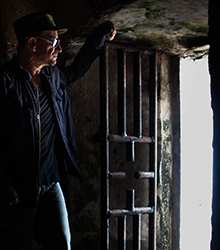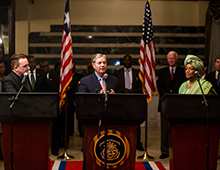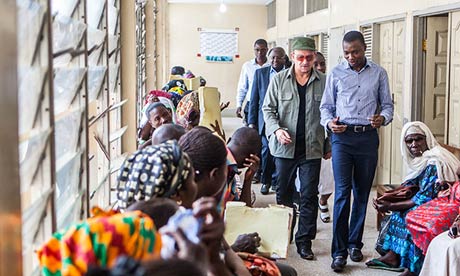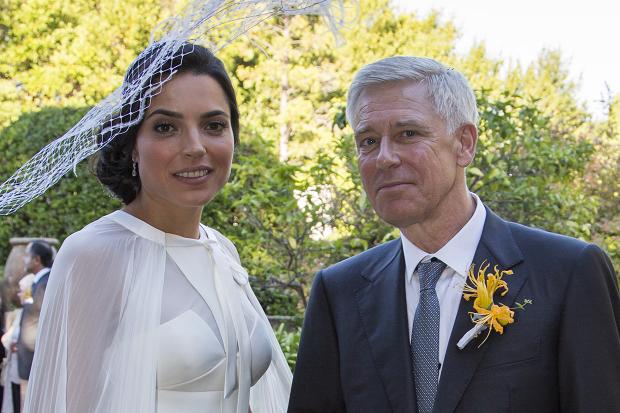Interviewed during a trip to west Africa, campaigner and U2 frontman Bono talks about what drives his activism and responds frankly to criticism of aid to Africa, his relationship with politicians and his group's controversial tax arrangements
For a week at the end of August Bono was travelling in west Africa, leading an invited group that included Condoleezza Rice, five Republican senators, corporate leaders from companies involved in the RED campaign (which donates money to the Global Fund to fight HIV/Aids), and artists including the LA dubstep pioneer Skrillex. The U2 singer was on what is a regular fact-finding mission – visiting hospitals, civil society organisations, politicians and young entrepreneurs – and introducing his eclectic tour party to some of the issues that his campaigning group ONE.org tries to keep at the forefront of global leaders' minds. Having spent the first half of the tour in Liberia, he was in the Ghanaian capital Accra when this interview took place. A couple of nights earlier at a downtown bar, I'd watched him give an impromptu performance of Stand By Me with the house band. That morning we had met local advocates for the agenda of transparency – both for governance and business in Ghana. During that meeting Bono had heard the news of the death of his friend Seamus Heaney, so we talked first about that, before broadening the discussion to his 25 years as an activist for African development, the lessons he has learned and those he is still learning.
First of all I should say how sorry I was to hear of Seamus's death, I know the two of you were long-standing friends…
You may not know that to every meeting I have ever had since I began full-time advocacy I have brought with me a book of Seamus Heaney's poems. I always think if you are asking somebody for something it is a good idea to give them something first. So I always give them Seamus's poems. This is from the pope to every president I have ever met. In this last week I gave Seamus's book Electric Light to President Johnson Sirleaf in Liberia. She is currently obsessed with the efforts to bring electricity to her people, so she could not believe it…
He was a fellow traveller?
Literally so. Seamus has been with me on every journey I have taken and there have been many times when a retreat into his words has kept me afloat. Most of our life in this kind of work is very concrete, full of facts, but we all have to seek redress from time to time in poetry. Seamus was where I went for that. He was the quietest storm that ever blew into town. "From the Republic of Conscience" has been like a Bible for me as an activist, something I have returned to for as long as I can remember. Some of those phrases are like tattoos for me, worn very close to the heart.
It's interesting to hear you make that distinction between the rigour of the arguments you have to put across, and the need for empathy. In a recent TED talk you presented yourself as the "factivist", the nerd who is aroused by the statistics of development, but for all the data there also has to be an emotional engagement for any of this to work?
I think that is why artists are useful in our kind of campaign. As a musician and a songwriter it is an act of the ego to believe that other people might be interested in your point of view. But it is usually an empathetic nature that gets you going in the first place. Music keeps the heart porous in many ways.
Yesterday you were mentioning the former "slave castle" at Elmina on the coast that you visited with some of your group. That seemed quite an emotional journey for all concerned.
 |
| Bono at the 'door of no return' at Elmina Castle, Ghana. Photograph: Jonx Pillemer/(RED) |
It was. And I wasn't expecting it to be. I didn't want to go. I thought I was here with a different agenda. But fate and a really hard-headed tour manager had us there and that obvious thing came home to me full force: that you can't begin to understand this continent without first understanding slavery. As ever the data is not super-sound, but it seems likely that 300 million lives were taken in three centuries. Only a third of those people survived. Hundreds of years of deliberate destruction of the fabric of African life, and the fabric of African families. I had never really confronted those facts in that way. And the guide we had there wasn't letting us off the hook at all. You know, someone said something about "Arab traders", but he came straight back: no, it was always the Europeans who were the cruellest, the worst. They were the drivers of it.
You suggested one of your inspirations as a campaigner was Josiah Wedgwood, and his inclusion of the slogan "Am I not a man and a brother?" in his pottery, which galvanised the abolition movement. Do you see him as a kindred spirit?
It was a kind of blueprint for what we are trying to do, certainly. The way they organised themselves, a lot of artists and writers involved – using slogans, including on bracelets I think. And like us they refused to hold their campaign hostage to a particular ideology. The abolitionists worked not from one political side or another but worked to find a radical centre. That is what we were thinking of when we called this the ONE campaign. That's why we work so hard in involving conservative opinion in it – everyone from religious conservatives to fiscal conservatives – which has made us unpopular with some people. That is also why we try to torture the left over protectionism in Europe as it affects farmers here. We try to be both popular and unpopular with everyone. And the abolitionists were a great model for that. Lincoln, of course, was a republican…
 |
| Bono, US Senator Lindsey Graham and Liberian president Ellen Johnson Sirleaf at a reception in Monrovia. Photograph: Jonx Pillemer/(RED) |

























